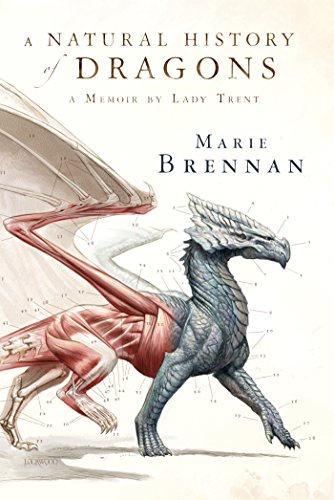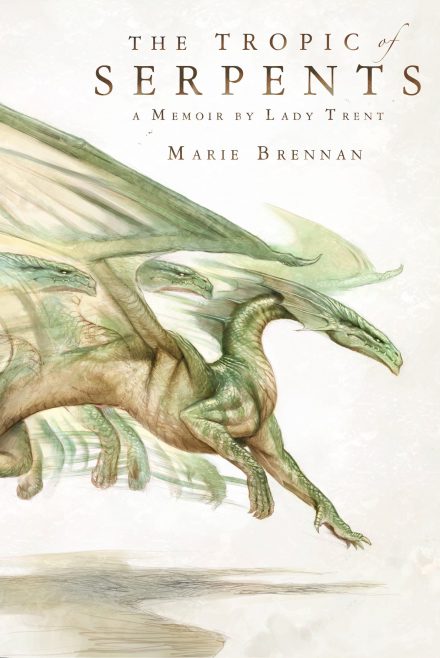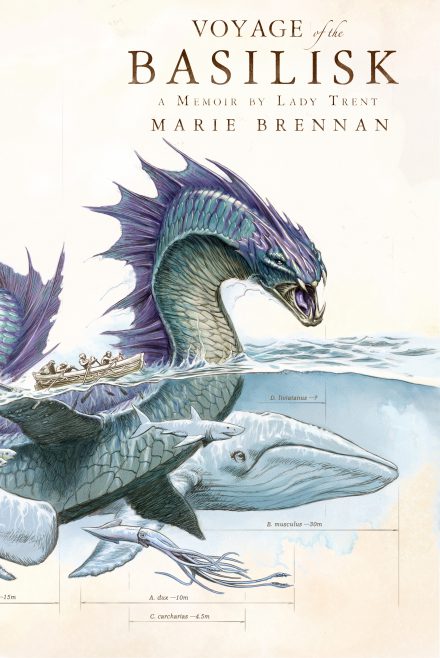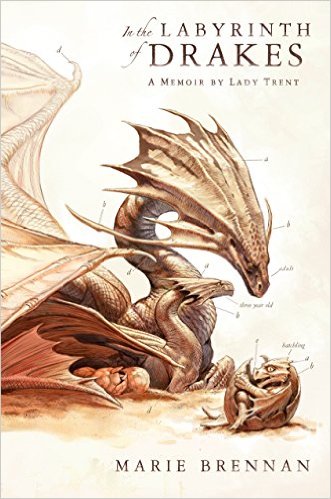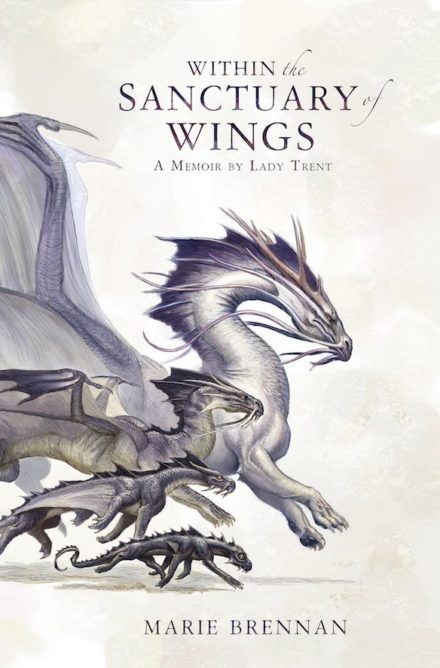Podcast: Play in new window | Download | Embed
Subscribe: Apple Podcasts | Spotify | Amazon Music | Email | TuneIn | RSS | More
An hour-long conversation with Marie Brennan, author of the Hugo Award-nominated Victorian adventure series, The Memoirs of Lady Trent, the Onyx Court series, and, as half of M.A. Carrick with Alyc Helms, the upcoming Rook and Rose trilogy.
Website
www.swantower.com
Twitter
@Swan_Tower
Patreon
New Worlds
The Introduction
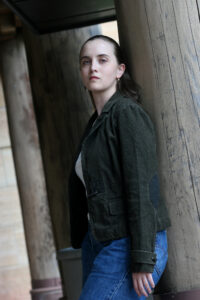
Marie Brennan holds an undergraduate degree in archaeology and folklore from Harvard University and pursued graduate studies in cultural anthropology and folklore at Indiana University before leaving to write full-time. Her academic background fed naturally into her work, providing her with the tools to build fantastical worlds.s a former anthropologist and folklorist who shamelessly pillages her academic fields for material.
Her first series, the Doppelganger duology of Warrior and Witch, came out in 2006. From there she moved to historical fantasy, first with the Onyx Court series (Midnight Never Come (2008), In Ashes Lie (2009), A Star Shall Fall(2010), With Fate Conspire (2011)), spanning three hundred years of London’s history, and then with the acclaimed pseudo-Victorian Memoirs of Lady Trent. The first book of that series, A Natural History of Dragons (2013), was a finalist for the World Fantasy Award, and won the Prix Imaginales in France for Best Translated Novel; the final book, Within the Sanctuary of Wings (2017), won the RT Reviewers’ Choice Award for Best Fantasy Novel. The series as a whole was a finalist for both the Hugo Award and the Grand Prix l’Imaginaire.
Brennan is a member of the Book View Café authors’ cooperative, where she has published the Wilders urban fantasies Lies and Prophecy (2012) and Chains and Memory (2016) as well as several short story collections and nonfiction works, including Writing Fight Scenes and the Patreon-supported New Worlds series of worldbuilding guides. Her fondness for role-playing games has led her to write both fiction and setting material for several game lines, including Legend of the Five Rings and Tiny d6. Together with fellow author Alyc Helms, she is the author of the upcoming Rook and Rose epic fantasy trilogy, which will come out under the joint name of M.A. Carrick.
She has taught creative writing to both college students and twelve-year-olds, and run several convention workshops on the art of fight scenes. When not writing or playing RPGs, she practices photography and shōrin-ryū karate. She lives with her husband in the San Francisco Bay Area.
The (Lightly Edited) Transcript
Welcome to The Worldshapers. Marie.
Thank you for having me.
I said Marie, should you say Marie and not Mary?
Yes, Marie. Yeah, I do run into that in Britain. I run into more people there who pronounce it Mary, which always throws me for a loop.
Well, of course, I’m in Canada, so we have a certain amount of British influence, so I have run into that as well. That’s why I thought, maybe I should just ask. Well, I don’t think we’ve ever actually met in person, although I suspect we’ve been at conventions together, like World Fantasy and WorldCon, I get to once in a while, I was at (World Fantasy) in Los Angeles last fall, but we never met. But I’m happy to have you on the show.
I’m very glad to be here.
We’re going to start the way I always start, and it’s kind of a cliché on here. I’m going to take you back into the mists of time, which, you know, has a nice science-fictional and fantasy ring to it right there, and find out, well, first of all, where you grew up, and how you got interested in writing, and particularly in writing this kind of stuff. It probably started with reading, as it does with most of us…?
Yeah, well, so, I grew up in Dallas. I actually lived in Texas for the first eight years of my life, all in one house, which is sort of remarkable. My parents still live in the house that they moved into about six months or so before I was born. So, I definitely have a feeling of deep roots there, which is sort of funny for people in other parts of the world, where deep roots mean something on the order of centuries. Yeah, six months before I was born! But that counts as deep.
It does in Texas.
Yeah, well, and, you know, it’s interesting to me because, at this point, the period of time that I lived in Texas is now less than half my life. I’ve been living in…I went to college in Massachusetts and then graduate school in Indiana. Now I live in California. But don’t try to tell me I’m not a Texan, which is probably how I prove I am a Texan, by contesting any claims to the contrary.
As I mentioned before we started, I wasn’t born in Texas, but I started school and everything in Texas and moved up here to Canada from Texas. And I clung to being Texan all the way through school up here.
Yeah, yeah.
I still self-identified as a Texan more than anything else.
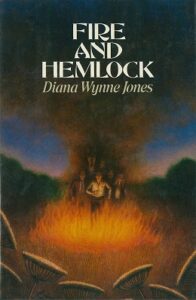
Yeah. I wonder if there’s a point where that will go away, but I haven’t found it yet. As for how I got started with writing, I mean, yeah, like, I read a lot as a kid, but for me, what happened was, you know, most kids make up stories, it’s just a really common thing for children to do. But specifically, when I was about nine or ten years old, I read a novel by Diana Wynne Jones, who was a British young adult and children’s author, really a children’s author, because the YA category kind of didn’t exist for a lot of her career, not as we think of it now. She’s got a novel called Fire and Hemlock, and in that there are two characters who are making up a story together and they’re, like, sending chunks of story back and forth from one to the other. And I remember putting that book down and thinking, I want to tell a story. And it wasn’t the first time I had, like, told stories. I’d made things up prior to then. But it was the first time that I really thought about telling a story for other people, for an audience. So, I pretty much decided at that age that I wanted to be a writer and kind of didn’t let go of that.
Well, did you share what you were writing? I mean, did you start writing to share it with your friends, or how did that work for you?
Remarkably little, all things considered, because, yeah, I did start writing things and, you know, some of them were for class because we had, like, creative-writing exercises. But I did this weirdly for somebody who had decided, “OK, clearly, I want to write stories for other people to read.” I then proceeded to turn inward and show virtually nothing of what I was doing to anybody.
Actually, for a good deal of time, I was really fairly self-taught with writing, I think in part because I was doing it in a way where my critical eye for what I was doing and my skill kind of developed in tandem, which was nice in some ways because…like, I’ve talked to a friend of mine who’s a professional artist about how the problem I have with trying to draw things is, at this stage of my life my critical eye is vastly better than my skill. So, I draw something, and I look at it and go, “That’s terrible!” And I don’t want to put in the work to go through all the terrible things before I get to the stuff that’s not terrible. But with writing, I basically…there’s the proverbial, “You have to write a million words of crap before you start writing anything good.” I wrote my million words of crap where I could only see, like, ten percent of the crappiness of it, and the other ninety percent, I was like, “That’s pretty good!” So, you know, I was able to kind of get through that stage at a period of time where I could see enough that I was improving, but not so much that I despaired that what I was writing was terrible, and I should just stop.
But yeah, during that time, I could probably count on the fingers of, definitely both hands, probably just one, the number of people I really showed my writing to, until I got to college. And then, my science fiction and fantasy group there had a writers’ group that would meet on a, like, weekly or every-other-week basis. And that was the first time that I kind of had, like, accountability for, “All right. I promised I was going to finish something for the next meeting, so I guess I’d better finish that.” And that was very good for my productivity. So, that actually led to me finishing my first novel—rather than my previous length, which had been an unfinished novel. That was all I ever wrote. I finished my first novel. I wrote the bulk of it the summer after my freshman year of college and finished it early my sophomore year. And that really got the ball rolling because that was the point at which I got serious about writing, and it stopped being a, “Oh yeah, theoretically someday I’d like to be a writer,” and started being, “OK, I have a finished novel. How do you submit those things?”
What was it that specifically drew you to science fiction and fantasy?
I mean, I was always interested in that kind of thing. And with regards to college, I tell people that I didn’t actually pick my major by saying what would be useful to me as a fantasy writer, but that’s kind of the effect that it wound up having. My studies, both in undergrad and graduate, I did archaeology and anthropology and folklore, which is all great stuff for a fantasy writer. And those were always just the things that interested me. I liked reading about the past. I liked reading about other parts of the world. I liked reading about mythology. It was all just…that’s what I liked from the start.
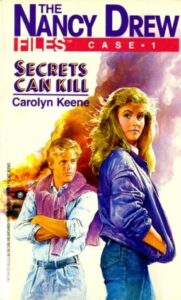
There was a brief period of time as a kid where I would have called myself a mystery reader because I imprinted hard on Nancy Drew for a while in elementary school and read truly stupendous quantities of the…like, I read the old hardcovers and then the paperbacks that they did for a while. And then they started doing the Case Files, which were those little, like, white-covered books, and I think I had over a hundred of them. It was, like, it was something absurd.
She’s been rebooted so many times, Nancy Drew.
Oh yeah. Yeah. Well, and actually I recently watched part of the CW series for Nancy Drew, which…it’s really sort of bizarre because it’s like somebody said, “You know what Nancy Drew needs? She needs to be cross-bred with Supernatural.” Like, there’s straight-up ghosts going on all over the place. I’m a little confused by it. But I watched the movie that was made a couple of years ago, and that was a lot of fun. It actually kind of reminded me of what I loved about Nancy Drew as a kid. But as I was starting to peter out on the mystery stuff, I hit a point where…I’ve got a brother who’s three years older than I am and I kind of ransacked his bookshelves and he had some, like, you know, adult fantasy novels there. And that’s kind of when I made the jump into reading fantasy, through Terry Brooks, actually,
I was going to say, were there any specific books that you credit with some of this.
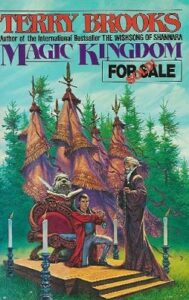
Yeah, the first one that I read in adult fantasy was Magic Kingdom for Sale—Sold!, which was his kind of like humorous, portal-fantasy thing.
I remember that one.
Yeah. And then I went from that to Sword of Shannara, which was something of a jarring awakening because that’s not the same kind of book. But the kind of absurd thing is that I’d read The Hobbit as a little kid, and I think I’d made like an attempt or two to read Lord of the Rings, but I hadn’t really gotten into it. But I did read Sword of Shannara, which, if anybody’s read that, you know, it’s basically a one-volume redo of Lord of the Rings with the names changed. And then, some years later, when I was in high school, I picked up the beginning of The Wheel of Time. And I’m probably the only person on the planet who read The Eye of the World and thought, “This reminds me of Terry Brooks,” rather than Tolkien, because I still hadn’t read Lord of the Rings at that point.
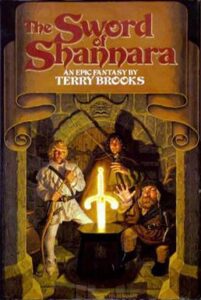
Yes, I remember when Sword of Shannara came out and reading it, and I had read Lord of the Rings, and thinking, “Wow, that’s really close.”
Yeah, it is basically a point-by-point retelling. But this is actually something that’s interesting to me because I mentioned that I studied folklore. There’s a concept in folklore studies called a tale type where, you know, you’ll have a tale type that is basically like Sleeping Beauty or Cinderella or something like that, where there’s kind of a skeleton of the plot and certain motifs that show up. And then there’s many different variants that you will find of that story in different parts of the world and different time periods and so on. So, like, with Cinderella, you’ve got Cenerentola, you’ve got Aschenputtel, you’ve got different versions in Italy, Germany, and so on. And actually, The Lord of the Rings is essentially a tale type that people like Terry Brooks and David Eddings and, to a lesser extent, Robert Jordan have kind of retold, in exactly the way that you see in folklore. So, it’s kind of neat to look at it from that direction because then it’s not, “Oh, my God, this is so derivative,” it’s, “What’s different in this variation? And what does that difference tell us? Like, what’s interesting about that?”
And of course, Tolkien’s whole idea was to create a kind of a mythology, a Northern Europe mythology.
Exactly.
And he was drawing on all the stuff that he knew. And he knew a lot, so…
Right. Yeah. You can, you know, certainly trace things to what were his inspirations for his bits. But in a way, it’s very appropriate that people then, you know, went and did a bunch of remixes of Lord of the Rings because that’s exactly what we do with mythology.
Now, you studied, as you mentioned, archaeology and folklore and all of that, and you went on to graduate studies. But somewhere in there, you decided writing was the thing instead of what you’d been studying all that time. What brought that about? Why did you make that choice?
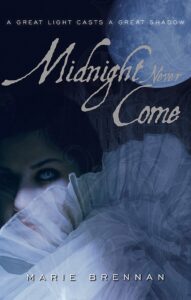
So, it happened while I was in graduate school. Just as I finished up…like, I continued writing novels all through college or grad school, and just as I finished up my coursework in grad school, I actually sold my first novel, which meant that basically writing moved from being a hobby to being an actual paying job right at the point when I lost to that, like, daily engagement with academia. So, a couple of years went by in which I didn’t really make the progress I should have towards, like, doing my qualifying exams and putting together a dissertation committee. And I had actually started writing the Onyx Court series, which were…I’d written Midnight Never Come, and I was about to do In Ashes Lie, with then the intent of doing two others. And I had possibly deluded myself, who knows, that I was going to be able to write novels while also writing a dissertation. But writing research-intensive novels while also writing a dissertation seemed more difficult.
And honestly, at that point, you know, it’s a time-honored thing to be a professor and a writer at the same time but I could kind of tell that, like, the dissertation and then the job hunt for your kind of, like, entry-level academic positions, that was going to eat a lot of time and energy in a way that I was worried was going to be detrimental to the writing career; that, you know, here I have this thing that is ongoing and making me money, not huge amounts of it, but money, and I didn’t want to, like, hamstring my writing career in order to do that. But if I wasn’t going to get an academic job, then was there any reason other than stubborn pride—which, let’s not discount the power of stubborn pride—but was there any reason to finish the PhD? And I was kind of going back and forth and wondering.
And then while I was asking myself that question, my husband, the company that he was working for, went bankrupt, and so, he didn’t have a job anymore. He works in IT. And so, southern Indiana, not a lot of IT jobs to be had, whereas if we moved to California, he could have a job basically tomorrow. So, we talked it over and basically decided, yeah, you know, if I’m questioning whether I should finish my PhD in the first place, let’s just go ahead and bail out of that and go to California. He got a job here, and since then, I’ve been writing full time.
That very first novel. How did the selling and that come about? How did you break in? That’s the question.
In a little bit of a roundabout way, because at the time—and mind you, I started submitting things back when submission involved print it out and stick it in an envelope and go to the post office.
Tell me about it.
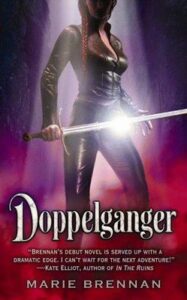
Yeah. Yeah. So, the way I usually phrase it to people is, like, it wasn’t quite the Cretaceous, but I’m not sure anatomically modern Homo sapiens had appeared on the scene yet. So, I had been sending it to publishers because at that point, a number of them did still accept, like, over-the-transom subs from authors without agents, and not only accepted them but would respond in something less than a geological epoch. And so, I was submitting novels, and I was also querying agents. And the second novel that I had written, which at the time was titled Doppelganger, it’s now Warrior, I had basically run out of publishers that took unagented subs to send it to. But I’d heard from somebody that you could sometimes kind of, like, sneak in the back door by sending them just a query letter, saying, “I’ve got this book, would you like me to send you the manuscript?” And at that point, it was no longer an unsolicited submission, they had said yes.
So, I sent off, like, two or three of those letters. I think it was Del Rey wrote back saying, “When we say we don’t look at unsolicited submissions, we mean it.” I think maybe one of them never responded, and the other one happened to land on the desk of Devi Pillai, who was an editor that I had met in passing at a convention. And she said, “Sure, go ahead and send it to me.” So I sent her the manuscript and, like a month later or so, I came home and found a message on my answering machine from Devi saying, “So, I read this, and I found it really interesting, and I showed it to my senior editor, and she reminded me that we don’t take submissions from people without agents, so go get an agent.” So I did. And this is something that will still happen occasionally now. Like I mean, unsolicited submissions are less of a thing, but if you get an editor saying, “Yeah, I’m interested in this thing,” you then go to the agents and say, “So, I’ve got, like, a provisional offer pending, basically.” And that helps get the agents to…not necessarily, they don’t all, like, offer, they still are looking at your body of work and whether you’re, like, a good match for them. But it means that they will respond more rapidly and say, “Oh, OK, there’s a thing that might be happening here.” So, I queried a couple of agents that I was particularly interested in, and one of them offered me representation. So, she then ended up negotiating that deal for me.
Yeah, that’s…in my case, I actually got the offer, and then I said to an agent, “Look, I have a contract. Would you like 15 percent of it?” And boy, that was easy to get an agent that way.
Yeah, but I would say, like, actually one of the agents I queried, said, “You know, I read through this and like, you know, I wish you the best of luck, but I just I don’t think I’m a good match for you.” And I think actually, you know, good agents will still pay attention to that rather than saying, “Oh, well, you know, it’s easy money,” but then they’re stuck with a client that maybe they’re not actually a good agent for them. And that’s not great for them in the long run. So…
Yeah, there are lots of pitfalls, that’s for sure, you can run into. And if you started in the Cretaceous or whatever it was, I started when it was still single-cellular life forms. So, I did a lot of that mailing into the great unknown and waiting, you know, a year or two for them to get back to you with rejection.
Yeah.
Well, let’s move on. You’ve written a lot of books since then…
Yeah.
And there’s been awards and…have you been surprised by the response you’ve had?
I mean, it’s sort of a weird question because, like, yes and no. On the one hand, I have healthy self-esteem. I actually have much less imposter syndrome, I think, than, especially, a lot of women tend to. And I don’t know why I managed to dodge a fair bit of that bullet. But in, like, specific instances, every time I’ve been told, like, “Oh, you’ve been nominated for this award,” it has completely blindsided me. It’s not that I’ve been like, “Ah, yes, that is my due, and of course, it is coming to me.” No, every single time, I’ve just kind of stared and said, “Really?” So, I kind of hope I never start to take that for granted because, at that point, somebody should slap me. But The Memoirs of Lady Trent, I will say, it did actually surprise me—because that’s the series that has gotten the most attention.
I love the covers.
Oh, the covers are fantastic. And that’s a chunk of why they’ve done so well, I fully believe. They’ve just had such amazing covers. But the previous series, The Onyx Court, like, that, to me, was an ambitious series. Like, it was my dive into historical fantasy, I was doing all of this research, I was, like, you know, grappling with some kind of big questions about, like, change over time and all these things. And, like, I was super ambitious with those and the books did fine, but there was no award attention or anything like that for them. And the Memoirs of Lady Trent, when I started writing them, I was, like, “OK, well, this is going to be this kind of, like, fluffy pulp adventure, like, Victorian kind of memoir thing.” I did not actually think of them as being all that deep when I started out. And the depth that they have, they very much kind of developed organically over time, as I found myself ultimately dealing with a lot of interesting questions in them. But I still sort of thought of them as being like, “Yeah, that fluffy adventure series that is kind of like lightweight compared to what I was doing before.” But I do think, yeah, they developed a lot more depth and complexity than I expected when I started. And so, yeah, those are the ones that have, you know, gotten the most, like, award nominations and some wins and such.
You’ve touched on the fact that you draw on your academic training and archaeology and folklore. And it’s interesting. I think you’re the, uh, you’re well…I’ve talked to more than fifty authors, so it’s hard to remember, but certainly Seanan McGuire comes to mind as somebody who has plumbed her knowledge of folklore.
And also of medicine. Jesus, the things that she talks about.
Yeah, she has those two sides, for sure.
Yeah.
So, you’re still drawing heavily on that. Do you find you’ve found that that’s been a really helpful thing to have in your background?
Oh, absolutely. I mean, that is honestly the wellspring from which my stories are coming. I think it was in, like, the last year I found myself calling myself an anthropological compost heap from which stories occasionally sprout up. It might not be the most dignified image, but I think it might be the most accurate.
I’ll remember it!
Yeah! I do a lot of reading about, like, different parts of the world, different time periods, and just kind of chucking all of that into the mental hopper. And so, you know, one of the questions writers will sometimes get asked is, “Do your story ideas start with a character or with a plot?” And I have the knee-jerk tendency to any such question to say, “I reject your false dichotomy.” But the smartass answer I’ll often give to that one is I start with a world. Which isn’t exactly true, but for me, the character and the problems that they’re dealing with and the world all of that is taking place in are so intertwined that in some instances I can, like, pull it apart and say, “OK, I can tell that I started with this bit over here.” Like, The Memoirs of Lady Trent, the idea for that one actually sprang partly out of a Dungeons and Dragons book and partly out of the Dragonology…I know there’s a book, but actually, for me, it was the wall calendars that I had, which are just like a field guide to dragons around the world. And D&D had a book called The Draconomicon, which was all about dragons, including things about, like, their life cycle and so forth. And it gave me the idea of, “What if I ran a D&D game where instead of, like, killing dragons and taking their stuff, the goal was to study them instead?” And I very rapidly realized that D&D’s mechanics are miserably suited to doing anything other than killing monsters and taking their stuff, so it turned into novels instead in my head. And so, with that one, it was kind of a character, of, OK, somebody who’s going to be studying dragons.
But it was about half a second later that that immediately became this kind of Victorian setting in my mind, because it’s a time period where there’s a huge amount of scientific inquiry, but it’s also so new that it’s possible to just kind of like leap in and make huge discoveries, whereas a lot of the science we have now, you’ve got to spend years studying it and learning all of the basic stuff before you can go and then make new discoveries, kind of on the edges of what’s known. So, I wanted that earlier period, where it was really easy to make the big exciting discoveries, and then that ended up shaping a lot of stuff about the character and so forth, because I can’t really think of characters not as part of their world. It’s why there’re whole genres of fan fiction out there that I just can’t get into, because to me, if you take characters out of the setting that they were in and make them, like, coffee-shop baristas or something, they’re not the same people. And it doesn’t work for me at all.
Yeah, my daughter was telling me about some of that kind of thing. She’s nineteen, so she’s much more plugged into kind of the fanfiction and things like that. And I thought, “Really? People do that?” Apparently, they do.
Well, but I mean, fanfiction as a whole is not remotely a new thing. And honestly, a lot of it goes back to what I was saying about mythology, that, yeah, we take these stories and we retell them. We’ve been doing that for as long as we’ve been human.
I suppose that’s true.
Yeah.
I wanted to mention on the Dragon studying side, years ago for a magazine called…what was it called? InQuest, I think? I think it was a Magic: The Gathering-focused magazine. And I wrote a few articles for them, and I wrote one, which was a fictionalized account of the last draconologist, whom I called Vladimir Kapusianyk, he was like one hundred and some years old, and he was living in a nursing home in Moose Jaw, Saskatchewan. And I had all this, you know, these theories about how dragons breathe fire and all that was really the core of it. And much to my surprise, I actually got letters that had been sent to the magazine, mostly from kids, saying, “Oh, I read the story about Vladimir Kapusianyk, and I really want to take up the mantle of being the next draconologist. And I had to send a note back saying, “I’m sorry, I made it all up.”
Yeah.
But it showed up on the Internet for years. I would find this as if it was… somebody had taken it seriously. And it was very strange. Well, speaking of worlds, that brings us very nicely to Driftwood, because that seems to be something that’s very much based around a very interesting world. Or fragments of a once-existing world, I guess.
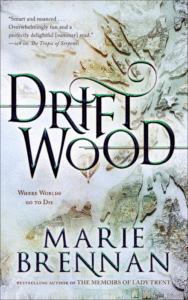
Yeah, many, many fragments. I don’t even remember how I got the idea for Driftwood. It just came to me at one point when I was in graduate school. Yeah. Driftwood, the sort of bleak tagline for it is, “where worlds go to die.” The idea behind it is that worlds have some kind of apocalypse like, you know, Ragnarok or whatever equivalent, but maybe not all of the world gets destroyed. And the fragment that is left drifts through what they refer to as the mist and eventually kind of runs into this mass of world fragments that’s called Driftwood. And they continue kind of decaying while they’re there because the…there’s sort of more of a high-level idea behind Driftwood than I normally have with my settings, which is that it is fundamentally a place that is about entropy and liminality, because it’s all of these fragments pushed together, and you’re constantly crossing borders within there in two different worlds where things operate a little bit differently, and then entropy, because they do keep decaying, they start out kind of large usually when they hit the edge, but then they sort of move inward toward a place that inhabitants of Driftwood call The Crush, which is the centre where the last few fragments basically get ground out of existence. And so, like, it’s odd because in some ways it’s a very bleak and nihilistic setting, and yet the stories that I’ve been telling there have all been about how do people adapt to that and how do they decide to hold on to the things that still matter to them and keep moving forward.
So, the Publishers Weekly review for the book Driftwood talked about it as being “hope in the face of apocalypse,” which was a much more timely phrase than I really expected when I was writing the book. This is an interesting year for that to be coming out here.
Well, it’s a collection of short stories. Some of them had been previously published. And then you wrote some new material for the book, is that right?
Yeah, it’s kind of a thing that used to be called a fix-up novel, which is to say, yeah, the bulk of the stuff in it is made up of short stories that I had published before. But then, I wrote a framed story to give context to why these stories are being told and, like, build a plot around them. And then there’s a new large piece, it’s a novelette, actually, longer than a short story, that I wrote to give, like, kind of a big centerpiece to it all. So, yeah, it’s not quite a short story collection. It’s a little bit like a mosaic novel because the different stories are told from different perspectives, which actually is very fitting, obviously, for Driftwood.
From the moment that I began publishing Driftwood short stories, I had people asking me…they thought the setting was great, and they’re like, “Will you ever do a novel there?” And my answer was always no, because it felt like a novel was the wrong thing for Driftwood. It’s about fragments. It’s about incomplete, like, bits and pieces, and a novel is a big, coherent, singular thing. But then when the idea came of doing it as this kind of mosaic fix-up novel sort of thing, that’s really appropriate for Driftwood, that it is something which is made out of smaller pieces brought together. And so, the form of what I’m putting out reflects the thing that it is describing in an interesting way.
Form follows function.
Yeah.
Well, this is the point at which I ask how you go about planning things, but it sounds like this one’s a little different. So, maybe let’s talk about what your planning process looked like for making this fix-up, but also what more typical for you and one of your novels.
So, I’ve had some changes happen with that over time. Like, I definitely am naturally more on the end of being kind of a discovery writer, or “pantser,” as sometimes is what people will say, which is that I’ll start off with, “OK, here’s a character in a situation with a problem. Let’s see what they do.” And I just kind of write my way through it. And that is more or less how I have written most of my novels. I’ll usually, at least by the time I’m partway through, have some ideas of things that I know I want to have happen later on. And then the metaphor that I’ll usually use is, there’s this big field in front of me, and I need to get to the other side of it. And I’ll go out there, and I’ll hammer a couple of pegs into the ground at various points and say, “OK, like, halfway across the field, I need to be over here.” And then I’ll kind of figure out an interesting path toward that peg on my way there.
So, a lot of the in-between stuff is very much make-it-up-as-I-go-along. But it does vary, because obviously with Driftwood, that was something where I didn’t so much have pegs as entire chunks of field that were already mapped. The interesting challenge there was figuring out how to sequence them, because the stories had nothing in them saying what was the order in which they had happened. They’ve all got a unifying thread, which is there’s this guy that everybody just calls Last, because he is the only survivor of the world that he comes from. His world is long gone. He should be dead. He’s still around. He appears to be immortal. And so, all of the stories have people interacting with Last for one reason or another, and so he actually also becomes the unifying thread for the novel, or for the book. But it meant I had to go through those stories and figure out, more kind of on a thematic level than a plot one, what was the effective order to put them in with the different kinds of moods that the stories had, and what was the reason those stories were being told at that moment. So, there was a lot of…I printed stuff out, very, very tiny, so that I could kind of arrange them all on my floor and move the stories around, looking at them and trying to get a feel for what was the best flow between them.
And then, at the far end of the spectrum, there’s this trilogy that I’ve been writing with my friend Alyc Helms, where, because we’re collaborating, I can’t rely on my usual thing of, I’ve got this vague cloud in my head that sort of evolves as I go along and I solidify bits of it as I go. Like, until we have telepathy, that doesn’t work. There’s another human being whose head also needs to hold what we’re doing. And so, for that one, it’s actually been much more rigorously planned than either of us ever does on our own, down to, there’s like a color-coded spreadsheet of the scenes with the color-coding showing whose point of view we’re using in each thing. It’s much more rigorously plotted than we tend to do. So, mostly I figure it out as I go along, except when I completely and totally don’t.
Well, how does that work in with all the research you’ve done for some of your stories? With the deep research, it would seem to me, would kind of, I don’t know, need a certain amount of planning along the way to know what you needed to research.
Yeah. I mean. It actually, in some ways, goes the other direction, which is that those pegs that I’m hammering into the ground, some of them come from the research. I’ll discover something and say, “Oh, that’s awesome. That needs to go into the book. Now, let me come up with a reason for it.” That actually happened, not even really a research thing, but the second of the memoirs, The Tropic of Serpents, I saw a photo of a portion of Iguazu Falls in South America where…it’s this huge extended, like, arc of waterfalls, basically, and there’s a spot in it where there’s kind of this, like, island of cliff jutting out in the middle of the waterfall. And I looked at that and thought, “That’s amazing. I am putting that in this book.” Why? “I don’t know. I’ll figure it out later.” So, like, there’s a whole chunk of plot in The Tropic of Serpents that happened because I wanted this island in the middle of a waterfall.
So, that was true a lot with the Onyx Court stuff, where I was…I could say very clearly, “OK, I need to read up on this time period.” And I would read books about daily life in that time period. And I did have slight amounts of outline for those just because…I mentioned that I play roleplaying games, and I ran a game, for people who know this one, Changeling: The Dreaming, I did a game where I wanted to make use of the fact that changelings reincarnate in that setting, that it’s the, you know, basically are born into a human host, and then when that host dies, they get reborn. And so, I wanted to do something that made use of that. So, I ran a game where the characters were reincarnating from lifetime to lifetime, doing this thing over a long period of time. Only they don’t always remember their previous lives. So, I was like, “I don’t want to make everybody buy high levels of the remembrance background to justify why they know…well, what if I did it backward?” And so, if you know the movie Memento, I called the game Memento, because it was all run in reverse. It started off in the present day with them finding out that apparently, they’d been doing something for hundreds of years that they didn’t remember, and then they drank from this magical well to remember. And the rest of the campaign, up until the very end, proceeded through flashbacks, where they were going back to their previous lives, remembering what they had already done that they didn’t remember. And I set this in London because I wanted an area that had been sort of continuously occupied for hundreds of years, which is hard to find in the United States. And London, you know, has a really nice, interesting, deep history. It also is an English-language country, which made research much easier.
And I didn’t do nearly the levels of research for the game that I did for the novels, but actually, the Onyx Courtseries ended up spinning out of some of the material from the game in kind of relatively loose ways in most of the books. But it meant that I knew things like, “OK, I’m going to a book that is set in the 17th century where the big climactic thing is going to be the great fire. OK, I’m going to go read about the Great Fire. Oh, there was that plague the year before. I guess I need to read about the Great Plague as well.” And then it ended up being, I wanted to do the warfare stuff that led up to that, so I had to go read about the English Civil War, which, wow, that was not something you should try to research in three months flat. But I would just, like, read about stuff in that time period and then build my plot out of the pieces that I found was actually the way that a lot of it worked rather than, “I know that I need to know this thing for my plot.”
Well, once you have whatever level of planning and outlining you’re doing on the specific project, what does your actual writing process look like? Do you, you know, take a quill pen out under the trees, or…?
No. I started writing on a computer when I was nine, and I never looked back. I have very occasionally written things longhand. Actually, there’s a prequel story for my Wilders series called The Bottle Tree, which I wrote as a reward to my Kickstarter backers for the second book, that I did write the entirety of that longhand while I was traveling. And that was bizarre. I’m not sure why I did that, but I did. Mostly it is on the computer, and…I’m strangely a solar-powered night owl. Like, I really need sunshine. If I don’t get sunshine, my batteries run down and I don’t function well. But I operate at my best, usually, from about 10 p.m. until two or three a.m. So, that’s actually when I do the bulk of my writing, is late at night.
So, that would be writing at home, not writing in a coffee shop then, probably.
Yes, I am lucky in that I’ve basically always had kind of a home office. You know, we’ve been able to have apartments or now a house where there’s a room that can just be my office. Though in college I had the ability to stick on headphones and work on a novel while my roommates were sitting like three feet away watching TV, I’ve lost that level of focus, I think.
Are you a fast writer or a slow writer?
Um, really, the answer to that question depends on who I’m being compared to, so, I guess, middle of the pack in the grand scheme of things. The math that I’ll do for, “How long is it going to take me to write this novel?” is that I average about a thousand words a day, which some people think is fast, some people think is slow. For me, that ties in partly with being more on the figure-it-out-as-I-go along kind of writing. I’ve found by trial and error that most of the time a thousand words a day is the pace at which I can figure out my plot. Like, I’m laying track right ahead of the train, and at that pace, I don’t run out of track. Usually, if I try to go faster, I’ll basically write myself into a corner, though I will go faster if I hit a stretch where I’m like, “Oh, yeah, I know the next several things that are going to happen. It’s just a matter of getting through them.” Then I will speed up.
It’s like the difference between laying truck on the prairie and laying track north of Lake Superior as the CPR did.
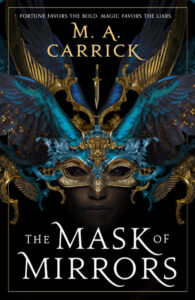
Yeah, I was about to say, the Rocky Mountains were what came to mind for me. Like, yeah, there are some Rocky Mountains stretches where it is slower. But then, when Alyc and I were drafting the first of the Rook and Rose books, we basically did NaNoWriMo for four months straight. We wrote a 200,000-word novel in four months, and that was in part because swapping off between us made the work feel lighter. It wasn’t like we were each doing half the work, but we helped keep each other’s enthusiasm up and, like, one of us might have ideas when the other was stuck, but also because we had to plan it so much that when we had a plan, it was like, “Well, is there any reason we shouldn’t write two chapters this week? No? Let’s go.”
Once you have whatever your first draft looks like, what does that first draft look like? Is it something that takes a lot of polishing and revision? What’s your revision process like?
No, I started off, and still am mostly, on the end of relatively clean first drafts. Now, I will say in the early days the relatively clean first drafts were in part because my revision skills weren’t as well developed. I say, not even really jokingly, that of the basic skills you need to be just, like, a competent writer who can be submitting your work somewhere, the last one I acquired was finishing what I started. So, on the level of, like, prose and characterization and so forth, like, I had those down before I had down the ability to have a complete story. But I definitely got a lot better at revision, at being able to see where it was possible to change things rather than feeling like it was kind of this fixed text in my mind. I’ve gotten better at being able to pull things apart and rework them for, you know, overall benefit. So, I do more revision now than I used to, but I’m also somewhat prone to doing chunks of that revision while I’m still drafting. So, I still frequently will wind up with a pretty solid first draft by the time that I’m done, as opposed to people I know where the first draft is, like, that’s where they figure out what story they’re actually writing, and once that’s done, they go back and write the real book. So, I’m not on that level of changing things.
My first guest on here was Robert J. Sawyer, whom I’ve known for a long time, and he was quoting Edo van Belkom, I think, another Canadian writer, who calls it “the vomit draft,” their first draft, because you kind of get everything out there, and it makes a huge mess, but you feel better, and then you just have to clean it up.
Yeah, yeah. I’m not quite that level of things. So, the first draft often pretty closely resembles the finished one.
What sorts of things do you find yourself revising as you go along, the things you have to watch for, and then catch in your own writing? Because we all have little things that we’re prone to. At least, I do.
Yeah. If it’s not a massive change, a lot of it is stuff like, “OK, I want to make a mention of this strand sooner so that it doesn’t kind of come out of nowhere later on when it becomes important,” or, “Oh, I tossed in that idea thinking I was going to do something with it and then it never went anywhere, so let me go back and remove that.” Then a lot of it is just going to be things of, kind of smaller-scale alterations just for pacing and such. Like, “OK, let’s get to the action here a little bit sooner,” or “Oh, I didn’t set that up well enough, so let me add in some more detail to give it context.” It is relatively rare most of the time for me to cut a whole scene or add in a whole scene, though that does happen, and that’s been happening more lately. That has definitely happened with the Rook and Rose stuff, because, in part, the plot there is so complex. And actually, the novel that I most recently finished, which is a book for the game Legend of the Five Rings, I was, like, super-excited to finish the book, in part because I had gotten behind and really needed to finish by deadline. And so, I kind of mushed through one night and, like, wrote the whole end of the book, and then stopped and looked at the last couple of chapters and went, “Those are crap.” Like, I just need to completely redo them. I should not have tried to finish the book that fast. So, I did actually have to do a rewrite, not in an “I’ve changed my idea about the plot” kind of way, but just in an “I did a bad job of that” way.
You’ve worked with a number of different editors, I would presume, with the number of books and different publishers. What sorts of feedback do you usually get from editors? Do they find your drafts as clean as you think they are?
It has varied. I will say that editors these days, they’re so overworked that a lot of them just don’t have the time for editing that, you know, they might have had, like, fory years ago in the days that you hear stories about. But it has varied a lot, also, depending on the editor’s personality. It’s ranged from, you know, fairly hands-off, like, Midnight Never Come, the first of the Onyx Court books, I think my edit letter from Devi was, like, half a page, Like, it was really brief. She did not want a lot of changes made, whereas Priyanka Krishnan, who’s the one we’re working with for Rook and Rose, is very much more hands-on and, you know, really getting into the text. She asked for us to add in a couple of scenes to flesh out certain things with the relationships in the story.
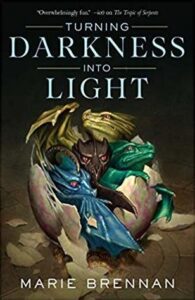
And I also wound up writing some new material for Turning Darkness into Light, the sequel to the memoirs, not because Miriam Weinberg, the editor for that one, specifically asked for it, but because she had concerns about this one flashback that was in the story, which her suggested fix for dealing with that flashback, I was like, “Oh, that doesn’t work for me for X, Y, Z reasons,” but the underlying reason she’d suggested that was that the flashback felt jarring, that it was like this one moment where it stops being kind of the present-day of the story and goes to something that happened five years ago. And so, when I talked with her, I said, “You know, I could flesh out some other things in the story if I gave a couple of the other characters similar kinds of flashbacks. What do you think of that?” And she said, “Yes, that works fantastically.” So, we were able to solve that problem by basically making that be not the only time the narrative jumped out of order like that. And it ended up assisting a bunch of other things that could use some, like complexity.
Well, I kind of jumped straight to the editor, but there are many authors who will take an intermediate step of beta readers or people like that. Is that something you’ve ever done? I never think of it because I’ve never done it. But I know it’s done!
I mostly haven’t. The sort of stepping-stone exception is Alyc Helms, the writer I mentioned, whom I’m working on Rook and Rose with, has been essentially my best writing buddy since the year 2000 when we met, because we think enough alike when it comes to writing and how we approach stories that…usually it’s not a finished draft, it’s, like, I’m halfway or three-quarters of the way through a book and I’m stuck, and I would fling the manuscript in Alix, going, “Help me!”, and they would read through what I had, and we would talk it over, and they would help me figure out how to proceed with the rest of it, which then ended up being part of how we wrote the Rook and Rose stuff together, because we said, “You know, we think a lot alike about this kind of stuff, like, hey, what if we tried writing something together?” And for that book, at Alyc’s suggestion, we did actually have a couple of beta readers, you know, people that we sent a finished draft to, but not the polished, fully ready-to-go one, and made some revisions based on the feedback that we got from that.
I guess the benefit of both beta readers and eventually the editor, of course, is just getting that fresh set of eyes on something that maybe you’re a little too close to.
Very much so. And that was why we were really eager for it with Rook and Rose, because that is a book with a lot of intrigue and a lot of stuff around, like, mysteries and misdirection and things involving…the Rook, actually, of the series title is this, like, you know, mysterious vigilante, et cetera. And so, we’re doing a lot of stuff around, “Who is the Rook?”, and it’s really difficult to judge that in your own work because you know all the answers to the mysteries and all the twists of the intrigue and who the Rook is, and so you can’t really judge very accurately whether you are providing enough information, but not too much information. Is the information in the right spot? You’ve got to get some outside eyes on that to tell you whether or not that makes sense. And those outside eyes have to be from somebody who doesn’t know the story already. Because we also had, my sister was serving as kind of our alpha reader in the, “We’re super excited about this thing we’re writing, and we want somebody to squee! at us about it. So, hey, you need to read the chapters as we finish them and tell us how clever we are.” She’s been very tolerant and patient with us, but she already knew the ideas behind the story, so she couldn’t tell us that stuff. We had to then get the beta readers once there was a finished draft.
I can remember who said it, but some writer said all that writers really want in a review is twelve single-spaced pages of closely recent praise.
Yeah. I mean, I will say I have gotten some reviews that had critical feedback in them that I did actually find useful. The one that particularly stuck with me, because it was such a simple thing, there was a review of Doppelganger when it was first published, when it was under that title, where the reviewer commented on me overusing italics for emphasis and things, and I looked at the text and was like, “You know, you’re right.” And so, I have since very much dialed back my italics.
I’m a little prone to…ellipses. Dot-dot-dot.
Oh, ellipses, semicolons, em-dashes, even colons, which are really not much in fashion in 21t-century fiction, but spending about five years writing like a Victorian lady had some bad influences on my prose. I want to use all the punctuation, thank you very much.
Just because you mentioned Rook and the Rook and Rose, I realized I kind of skipped over one step, which is characters. How do you find the characters for your story, and how do you develop them?
That is very much an organic back of the brain process for me. I’m not the sort of person who sits down and consciously constructs like, “OK, let me figure out, like, go through a questionnaire and create the character.” The part of the process that does get a little more conscious is, I will try to prod myself out of certain defaults about like gender, sexuality, ethnicity, et cetera, and say, “Well, like, whatever I default to, maybe I should try to do something different,” just to be, like, aware of that and make sure I’m not doing the same thing over and over again. But characters are kind of a subconscious gestalt thing for me. I don’t get emotionally invested in them if I construct them in a very logical sort of way. And I need them to…in a way, I need them to be able to surprise me, because some of the best moments in my stories tend to be the ones where, “I didn’t plan that!” It was just the moment where I’m in the middle of writing the scene and the thing that I intended for the character to do, there’s just kind of this feeling of, “No, that’s not the right thing. The thing that they would do in this moment is this other thing.” And that invariably is actually the more interesting thing to have happen rather than what I had planned.
And this does mean that I wind up with random things sometimes where I’m, like, “Why do I know this about that character? Like, this isn’t even relevant to the story,” but just, I am sure of that fact. There’s an incredibly minor character who shows up in, I think, one scene in the third Onyx Court book where, he’s gay, I know that he’s gay. Why do I know this? I don’t know. It just, it’s not relevant to the story, and I’m not looking for anybody to pat me on the back for a thing that you completely cannot tell by reading the book, but it’s just a fact about him that my brain has provided to me.
Well, and that is one of the fascinating things about the whole writing process, is the way that, you know, what are our brains doing in there while we’re writing?
Yeah.
Because every writer has similar stories.
Yeah. It’s a neurologically weird thing, because we are wired to kind of model human behavior in our minds and to, like, imagine what people might do in certain situations. And so, creating characters is kind of a process of, you know, leveraging that for fictional purposes. And if you do it well, then it does start to feel like there’s…or it can, because, I mean, obviously not every writer works the same way. But for me, if I have done a good job of creating the character in a believable fashion, then it does feel a little bit like there’s this real thing and I need to figure it out as opposed to I need to make the decisions. And that’s just kind of how I approach it.
Well, I guess I kind of brings me to the other cliché on here: the big philosophical questions of why? Why do you write, why do you write this kind of stuff, and why do you think any of us write?
Because we’re too dumb not to? I don’t know. Like, it is just something where, this is what my brain has always done. And over the years since I was nine and decided I wanted to be a writer, I have encouraged my brain to do more of this. You know, we kind of respond to rewards, and so if I enjoy doing the writing, which I do, then I have this feeling of, “Oh, I want more of that enjoyment, let’s do more of that.” And so, my brain generates more ideas for me. I’m not the sort of person…I think it was Vonnegut who said, you know, “I hate writing, I love having written.” I love writing when it’s going well. There are days where it’s like pulling teeth, but when it’s going well, I’m discovering things. That’s part of why I write the way that I do, with less planning, usually, because I want that feeling of, “Oh, I didn’t see that coming. And now I get to enjoy it kind of in the way that the reader does.”
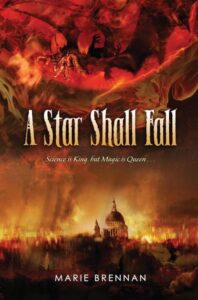
And there is a dark side to that reward cycle of, “OK, I have trained my brain to understand that I will be happy if I do these things,” which is that it will continue to offer up ideas, sometimes is the most inappropriate ways. The one that really sticks with me—and this was, again, during the I stuff, when I was writing A Star Shall Fall—you know, like, you wake up in the morning, and there’s that period of time where you’re awake, but you don’t quite have clear thoughts going through your head yet, and so, I’m lying there in bed, and I stretch, and the first clear thought that emerges in my head is “Vivisection!” And I’m just lying there going, “OK. Yes, that is a really good idea for the plot because that works very well with X, Y, and Z. Could you not have waited like ten minutes? Let me get vertical first?” No, first thought of the morning, “Vivisection!” Because clearly, I’d been thinking about the story in my sleep and that was what popped out of. So yeah. Every so often…and I recognize it’s weird to talk about my brain like it’s somehow separate from me, but it’s like I’m standing there looking at my brain going, “Really? Really? That’s what you give me?”
Yeah. I can identify. Well, as someone whose studied folklore, you know that, you know, humans have always told stories. Where do you think that comes from?
It’s part and parcel, I think, of us being social creatures, that some of the storytelling is ways for us to understand the behavior of the other people around us and to prepare ourselves for, “If other people do this then I can do that, and this will produce good results.” But it is interesting to me that to the best of our knowledge, to the best of my knowledge, anyway, we are the only creatures that do tell stories. Because it’s been fascinating watching studies in animal cognition, kind of taking the things that we thought were uniquely human and sort of one by one saying, “Well, we might do that more than other animals do, but we’re not the only ones who do it,” like, you know, language and such. No other creatures have, that we know of, languages the way that we do, but they communicate in some incredibly complex ways. Like, there are cetaceans, like whales and dolphins and such, that have names, like, there are specific sounds that are used to identify specific creatures within a pod, and so, that’s names. And, like, killer whales have culture, in the sense that different pods have different ways of playing that get passed down between the generations, and as an anthropologist, I don’t know of any definition of culture that would not include pod-specific methods of playing passed down between generations.
But storytelling, we don’t, that I know of, have any evidence that other creatures do this. And so, that’s kind of a unique thing about humans. And I think it’s an evolutionary advantage. It’s something where we can imagine what might happen in the future and teach ourselves to be ready for that. Even if what we’re doing it with is stuff that’s not realistic, we’re still learning useful brain lessons from that.
Well, the name of the podcast is The Worldshapers. Do you hope that you’re writing in some way…I mean, shaping the whole world is a bit grand, very little fiction has ever done that, but perhaps shaping other people or, you know, shaping it in some small way?
Yeah, I mean, I try not to think about that too directly while I’m writing because I know me, and I know that tends to lead me in very kind of didactic, preachy directions. I can’t have that at the forefront of my mind, or it winds up resulting in bad stories. But I do have that as a general…like, I hope that my stories do some good in the world. The memoirs, in particular, have gotten a lot of responses from, you know, women working in different fields of science who tell me how much it means to them to see this kind of character, like, “Who’s this lady doing science?”
My wife’s an engineer, so…
Yeah, yeah. And like, there’s a character in the memoirs who is…the term asexual doesn’t get used for her, but she is, she kind of talks about it in ways that make that apparent if you’re looking for that kind of thing. And so, I’ve gotten messages from some ace readers who are just like, “Oh, my God, it makes me so happy to see a character like this in a story,” because it’s really important to us to see people like us being reflected in fictional worlds rather than being written out of them. And so, that is part of why I do this, like prodding the default thing of saying, “OK, well, you know, I haven’t really talked about people who are like X, Y, Z. How can I fit that in here?” Because I do want people to have that feeling of recognition and feeling like they’ve been seen and that they’re a part of the world. But I try to kind of, like, think about that at the moments when it will be a good inspiration rather than, “Now I will do the very special episode of…,” because that’s just…nobody wants to read that.
“A very special episode…” Well, you’ve talked a little bit about what you’re working on, but just want to reiterate that you have the collaboration coming up, The Mask of Mirrors, first in the Rook and Rosetrilogy with…who was your co-writer?
Alyc Helms, but it’s coming out under the joint name of M. A. Carrick.
Is this the first time you’ve written as M.A. Carrick together?
Yeah. We knew that editors might ask for a joint pen name, so we had one picked out just in case.
And what are you working on yourself?
So, The Night Parade of Demons is the Legend of the Five Rings novel I mentioned, that’s going to be coming out in February of next year, not too long after The Mask of Mirrors, and obviously, Driftwood is coming out in August. Other than that, short fiction, stuff for the Patreon. I figure having three novel projects kind of at various stages of production is enough for the moment.
And you wanted to make a mention of your Patreon?
Oh, yes, because Worldshapers! The Patreon is called New Worlds, and it is all about worldbuilding. The genesis of it is, basically, I love worldbuilding, I love talking about anthropology and such, and for a long time I felt like I wanted to write a book about that, but I couldn’t figure out how to wrangle a topic that large into book shape. And then eventually it came to me that, well, if I did it as a Patreon, then, rather than trying to tackle the whole thing at once, I could just do weekly essays on different aspects of culture and worldbuilding. And then, maybe after I had written those, I could shuffle them into book shape. So, I started that up. It’s now over three years and counting that I have been writing weekly essays about different aspects of worldbuilding, and I’m not done yet. So, that feeling of, “It’s a ittle difficult to put this in book shape!” was not wrong. What I’ve been doing is, at the end of each year, I put out an e-book that collects the essays from that year, organized into the best shape possible, with the topics that my patrons have voted for. And I think probably when I do finish, whenever that happens, I’ll probably go back and reorganize them into some larger volumes that will be a little bit more kind of thematically organized around different spheres of human culture. But that is some way off, because I’ll need to finish going through all the bits and pieces before I can put together the whole thing. So, yes, it’s proven really, really useful for me, because it means I don’t have to figure out the organization ahead of time. I can just kind of dive into all the interesting little corners and then organize them afterward.
And where can people find you online? You use Swan Tower rather than your name for most of your things, it looks like.
Yeah, that actually dates back to when I thought I was going to be in academia as well, and I wanted a like kind of website and general branding that could cover my academic studies, because I was studying science fiction and fantasy stuff, as well as my fiction work. That ended up not being necessary, but I like Swan Tower. So, SwanTower.com, as one word, is the website, and that has links to the Patreon, which is New Worlds, and that’s also, Swan_Tower is my username there. I am Swan_Tower on Twitter. That’s pretty much it for me on social media. I’m not on Facebook or anything like that.
Ok, well, thanks so much for being a guest of The Worldshapers today. I enjoyed that. I hope you did too.
I did, too. Yeah. Thank you very much for doing this.
And this should come out…well, of course, whoever’s listening to this will know when it’s out. It should come out about the same time as Driftwood, in August. So perfect timing.
Sounds good.
Thanks again for being on.
Well, thank you.

